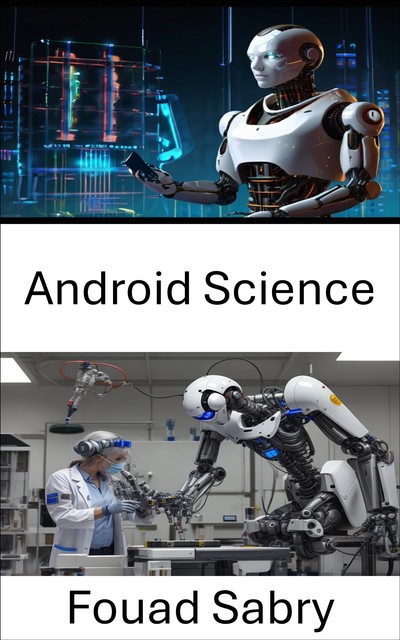We use cookies to improve the Bookmate website experience and our recommendations.
To learn more, please read our Cookie Policy.
To learn more, please read our Cookie Policy.
Accept All Cookies
Cookie Settings
Something went wrong. Try again.
1: Android Science: Explore the foundational principles and key theories that define android science today.
2: Android (robot): Understand the technical aspects and evolutionary journey of humanoid robots designed to replicate humans.
3: Humanoid Robot: Delve into the unique characteristics and challenges faced by robots designed with humanlike features.
4: Masahiro Mori (roboticist): Learn about the pioneering work of Masahiro Mori and his impact on robotics research.
5: Uncanny Valley: Examine the psychological response to robots that resemble humans but fall short, creating discomfort.
6: Social Robot: Investigate robots designed to interact socially, bridging the gap between humans and machines.
7: David Hanson (robotics designer): Discover David Hanson's role in designing lifelike robots and advancing the field.
8: Developmental Robotics: Focus on how robots learn and adapt over time, mimicking the developmental stages of humans.
9: Actroid: Dive into the Actroid series of robots, known for their realistic appearance and expressions.
10: Social Affordance: Understand how robots can design interactions that encourage human engagement and cooperation.
11: Human–Robot Interaction: Explore the dynamics of how humans and robots communicate and collaborate.
12: Affective Design: Learn how robots are being designed to understand and respond to human emotions.
13: Lucy Suchman: Discover Lucy Suchman’s contribution to understanding the social dynamics of humanrobot interaction.
14: Uncanny: A closer look at the concept of “uncanny” in robotics, and how it impacts human perception.
15: Hiroshi Ishiguro: Study the innovative work of Hiroshi Ishiguro, a leader in creating robots that mirror human behavior.
16: The Media Equation: Understand how humans perceive robots as social actors in media and reallife scenarios.
17: Embodied Cognition: Delve into how the body and the mind work together in the design and interaction of robots.
18: Telenoid R1: Examine the Telenoid R1 robot and its role in emotional and social robotics research.
19: Artificial Empathy: Explore the concept of artificial empathy and how robots might develop the ability to feel and respond.
20: Julie Carpenter: Learn about Julie Carpenter’s research into how humans and robots relate to one another.
21: Robots in Literature: Conclude with a look at the portrayal of robots in literature, highlighting their cultural significance.
2: Android (robot): Understand the technical aspects and evolutionary journey of humanoid robots designed to replicate humans.
3: Humanoid Robot: Delve into the unique characteristics and challenges faced by robots designed with humanlike features.
4: Masahiro Mori (roboticist): Learn about the pioneering work of Masahiro Mori and his impact on robotics research.
5: Uncanny Valley: Examine the psychological response to robots that resemble humans but fall short, creating discomfort.
6: Social Robot: Investigate robots designed to interact socially, bridging the gap between humans and machines.
7: David Hanson (robotics designer): Discover David Hanson's role in designing lifelike robots and advancing the field.
8: Developmental Robotics: Focus on how robots learn and adapt over time, mimicking the developmental stages of humans.
9: Actroid: Dive into the Actroid series of robots, known for their realistic appearance and expressions.
10: Social Affordance: Understand how robots can design interactions that encourage human engagement and cooperation.
11: Human–Robot Interaction: Explore the dynamics of how humans and robots communicate and collaborate.
12: Affective Design: Learn how robots are being designed to understand and respond to human emotions.
13: Lucy Suchman: Discover Lucy Suchman’s contribution to understanding the social dynamics of humanrobot interaction.
14: Uncanny: A closer look at the concept of “uncanny” in robotics, and how it impacts human perception.
15: Hiroshi Ishiguro: Study the innovative work of Hiroshi Ishiguro, a leader in creating robots that mirror human behavior.
16: The Media Equation: Understand how humans perceive robots as social actors in media and reallife scenarios.
17: Embodied Cognition: Delve into how the body and the mind work together in the design and interaction of robots.
18: Telenoid R1: Examine the Telenoid R1 robot and its role in emotional and social robotics research.
19: Artificial Empathy: Explore the concept of artificial empathy and how robots might develop the ability to feel and respond.
20: Julie Carpenter: Learn about Julie Carpenter’s research into how humans and robots relate to one another.
21: Robots in Literature: Conclude with a look at the portrayal of robots in literature, highlighting their cultural significance.
more
181 printed pages
- Original publication
- 2024
- Publication year
- 2024
- Publisher
- One Billion Knowledgeable
Have you already read it? How did you like it?
👍👎
fb2epub
Drag & drop your files
(not more than 5 at once)


